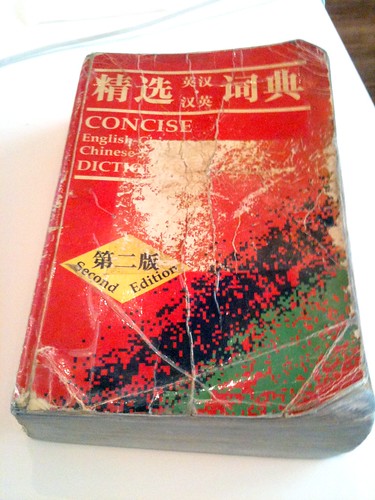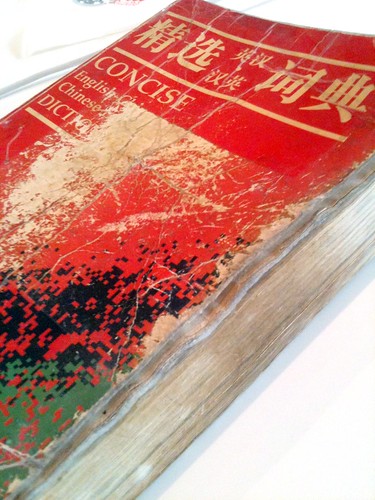Ode to a Paper Dictionary
The Oxford Concise English-Chinese Chinese-English Dictionary is a solid dictionary. It’s a great compromise between “comprehensive” and “portable,” and it’s the one I had with me in my early days in Hangzhou, when I had to look up every other word that I heard. I started with the “handy pocket-sized” version, but I quickly realized that even though it was half the size, it was still a little brick of paper I had to slug around, and the characters were just way too small at that size. So I used the medium-size brick of paper comfortably for years.
I still have that dictionary, although it’s showing its age. Over the years, I have had to use packing tape to reinforce its edges and spine, but at least I managed to do that before it started totally falling apart. Here’s what it looks like now:
Slightly worn, you might say.
When I used this dictionary regularly, I used to highlight words, phrases, and sentences that popped out at me as being useful or somehow study-worthy. What’s great is that I can still browse the dictionary now and see what I once highlighted. Sure, nothing is dated; there is no metadata. But it’s enlightening and amusing to flip through this paper record of my progress.
A little sample:
– 避免 to avoid
– 关心 be concerned about
– 关于 about; on; with regard to; concerning
– 上当 be taken in
– 下流 obscene; dirty
– 大海捞针 look for a needle in a haystack [I’m pretty sure I never ever had a chance to use this, even if I managed to memorize it briefly]
You get the idea.
But the point of this post is not to recommend a great dictionary. I used that dictionary every day for a very important period in my life, and it facilitated all sorts of conversations on a regular basis (yes, I was one of those annoying students that would occasionally put a conversation on hold if there was a word I felt I just really needed to know right away). And yet, I don’t recommend that dictionary much at all. Nowadays I regularly recommend Pleco (and sometimes Wenlin) to AllSet Learning clients, but not paper dictionaries.
Why? Well, there are a number of reasons…
– Most people don’t want to carry around a heavy book, but they take their cell phones everywhere
– Most people find looking up words in a paper dictionary quite a hassle
– Electronic dictionaries are so fast, and with one more touch you’ve saved the word as well for later reference
I remember when I first came to China, lots of people were using mini hand-held electronic dictionaries. They were great, except that (1) they rarely provided pinyin for English-Chinese lookups, and (2) they had short dictionary entries with very few sample sentences. Well, those days are over. The day has finally arrived, and entries are now bursting with information, while internet connectivity offers potentially limitless sample sentences.
So why am I still a little sad? Well, there’s definitely something to be said for idly flipping through those pages made of paper. I’m not sure why dictionary serendipity of the eyes-to-paper variety feels more special than dictionary serendipity of the search-and-related-data variety, but it does. And looking at that old battered paper dictionary, its mere existence does feel meaningful. I beat the crap out of that thing with my learning, and then did just enough work to keep it on life support. And now I neglect it, relegating it to a bathroom book, while computer-based dictionaries serve my daily needs.
We had some good times, paper dictionary. It’s not you, it’s me. But relationships change.



John,
First time commenter here.
I could have written the first half of this post about the Oxford Concise English-Chinese Chinese-English Dictionary. It was my first Chinese dictionary and served me very well. My cover fell off but I taped it back on.
Unfortunately, before I left Tianjin, China, after living there for 7 years, I threw it away as I had so much stuff to bring back to New Zealand.
After reading this ode, I wish I hadn’t.
Thanks for the great post, John.
I’m on at least my third copy of that dictionary. The previous two took such beatings they had to be euthanased. I love my books, but I’m hard on them, I have to admit. My first two copies were the small size, but I’m now on the big character edition, not because I’m so old I need large print, but because, just as I needed to put my last small one down, I inherited it from a friend who, like yourself, had moved on to electronic dictionaries. I can not approve of such disloyalty.
I do use online dictionaries and similar tools, and I tell my students that they should use whichever kind of dictionary suits them best, but study-wise I’m an old fashioned kind of guy. I like my dictionaries dead tree. There’s something about having to look up new characters via the radical index which just works better for me. And I may well be a hopeless Romantic, but you just can’t beat the texture and smell of paper and ink.
Thank you for this post.
I also started with the Oxford Concise Dictionary (though in the beginning the pocket yellow Langenscheidt was just as useful). It is now taped together, has the “I Voted” sticker from the 2004 Presidential election and some other cutesy sticker I got in high school Chinese class. I will never throw it away, but then again I collect Chinese dictionaries so maybe I’m not a good example.
My Oxford Concise Dictionary is, however, not with me here in Guangzhou. Like you say, Pleco, Wenlin and the internet serve us so damn well. Last year when I was at the Hopkins-Nanjing Center studying I would pursue the library’s wonderful dictionary collection and think about all those poor souls back in 1992 or whenever that had to resort to paper dictionaries for everything.
Today we feel that we are so lucky to be able to draw characters on our iPhones and immediately know what we are looking at. However, I have always wondered if the mere act of looking up a character by radical or pinyin and flipping through a book for the answer to our curiosity somehow makes storing the word in our brain easier. The idea being that, like Google and Wikipedia, knowing that we have Pleco on hand all the time makes actually remembering a word seem less necessary.
I just know deep down that paper dictionaries must always have their place in the lives of Chinese language students.
Grab some shipping tape and place it on the front and back cover. That’s will lessen the tear and tear, and also make the covers more sturdy. I do it all the time to my important paperbacks.
This post struck a nerve with me. I had been using an Oxford Chinese dictionary for a couple of years. This past spring semester, I had a Beijingren teacher who had purchased an electronic translator during one of her trips back home. She kept bugging and bugging me to buy either a translator or an IPOD/IPAD on on which I could load PLECO. She complained that looking up words in my dictionary was too slow and sometimes a word wasn’t in it. So she kept bugging me and bugging me so finally I gave up and decided to spend the $250 to buy an IPOD and upload PLECO on it. Well, I love that IPOD now. It’s so convenient and whenever there’s a wireless network (such as at the school or coffee shop), I can do my homework, also going on the Internet to other sites like MDBG and NCIKU. BTW, my teacher ended getting an IPAD for herself! And my paper dictionary is sitting on my desk collecting dust, but I’ll still keep it for sentimental reasons.
Written like a true bibliophile. Gee, can’t imagine where you got that trait! 😉
For me, physically flipping through a dictionary just to locate a character beats searching for it on electronic dictionary or accessing it on the internet. And it helps you to better retain it in your memory especially with a difficult language like Mandarin. And I am a Chinese. Can’t agree more with you on the touch and smell of paper and ink. You should retain and treasure the old dictionary, it’s part of you, as least it reminds you of how you struggled to learn the language and the progress you have achieved. Good post.
[…] I broke out my trusty old Oxford dictionary (we still learned Chinese from actual books in those days), and looked up 嘛. Here’s what I […]